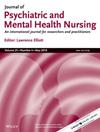Effectiveness of a spiritual adaptation of cognitive behavioural therapy in improving resilience, self-esteem and spirituality among clients with opioid use disorder: A quasi-experimental study
Abstract
What is known on the subject?
- Opioid use disorder (OUD) is a prevalent problem among Egyptian youth, and achieving recovery and abstinence is challenging. Cognitive behavioural therapy (CBT), a well-known approach, can be particularly beneficial when it addresses psychological aspects such as resilience and self-esteem.
What does the paper add to existing knowledge?
- Our research is recognized as a trailblazer in integrating a spiritual adaptation of CBT with spiritual elements for treating patients with OUD in the Egyptian context. This innovative approach marks a significant advancement in the field.
- The study found a statistically significant increase in the mean scores of resilience, self-esteem, and spirituality (p < .001 each) following the spiritual adaptation of CBT sessions compared to the control group.
What are the implications for practice?
- The findings can guide psychiatrists and nurses in providing more comprehensive and effective care to patients with OUD by incorporating a spiritual adaptation of CBT with spiritual components into treatment plans.
Introduction
Opioid use disorder (OUD) is a prevalent problem among Egyptian youth, and achieving recovery and abstinence is challenging. Cognitive behavioural therapy (CBT), a well-known approach, can be particularly beneficial when it addresses psychological aspects such as resilience, self-esteem and spirituality.
Aim
This study aimed to evaluate the effectiveness of a spiritual adaptation of CBT in enhancing these factors among clients with OUD.
Methods
A quasi-experimental study with a control group was conducted using a pretest-posttest design. The study included 49 clients with OUD and 46 clients in the control group. The Rosenberg Self-Esteem Scale–Modified Arabic Version, Daily Spiritual Experience Scale, and the Connor–Davidson Resilience Scale were used as measurement tools. CBT was delivered in 60-min group sessions. After 3 months, the questionnaires were re-administered to evaluate the effectiveness of a spiritual adaptation of CBT sessions.
Results
The study found a statistically significant increase in the mean scores of resilience, self-esteem and spirituality (p < .001 each) following a spiritual adaptation of CBT sessions compared to the control group.
Discussion
A spiritual adaptation of CBT effectively enhanced resilience, self-esteem and spirituality in clients with OUD.
Implications for Practice
Understanding the effectiveness of a spiritual adaptation of CBT in enhancing resilience, self-esteem and spirituality can enable psychiatrists and nurses to provide more comprehensive and effective care to patients with OUD.

 求助内容:
求助内容: 应助结果提醒方式:
应助结果提醒方式:


